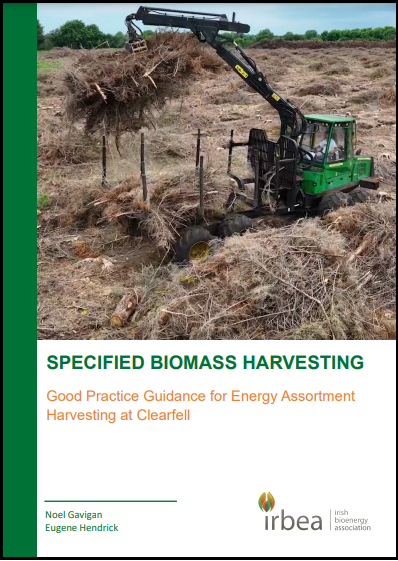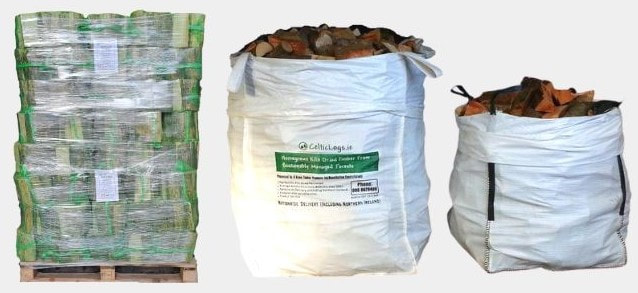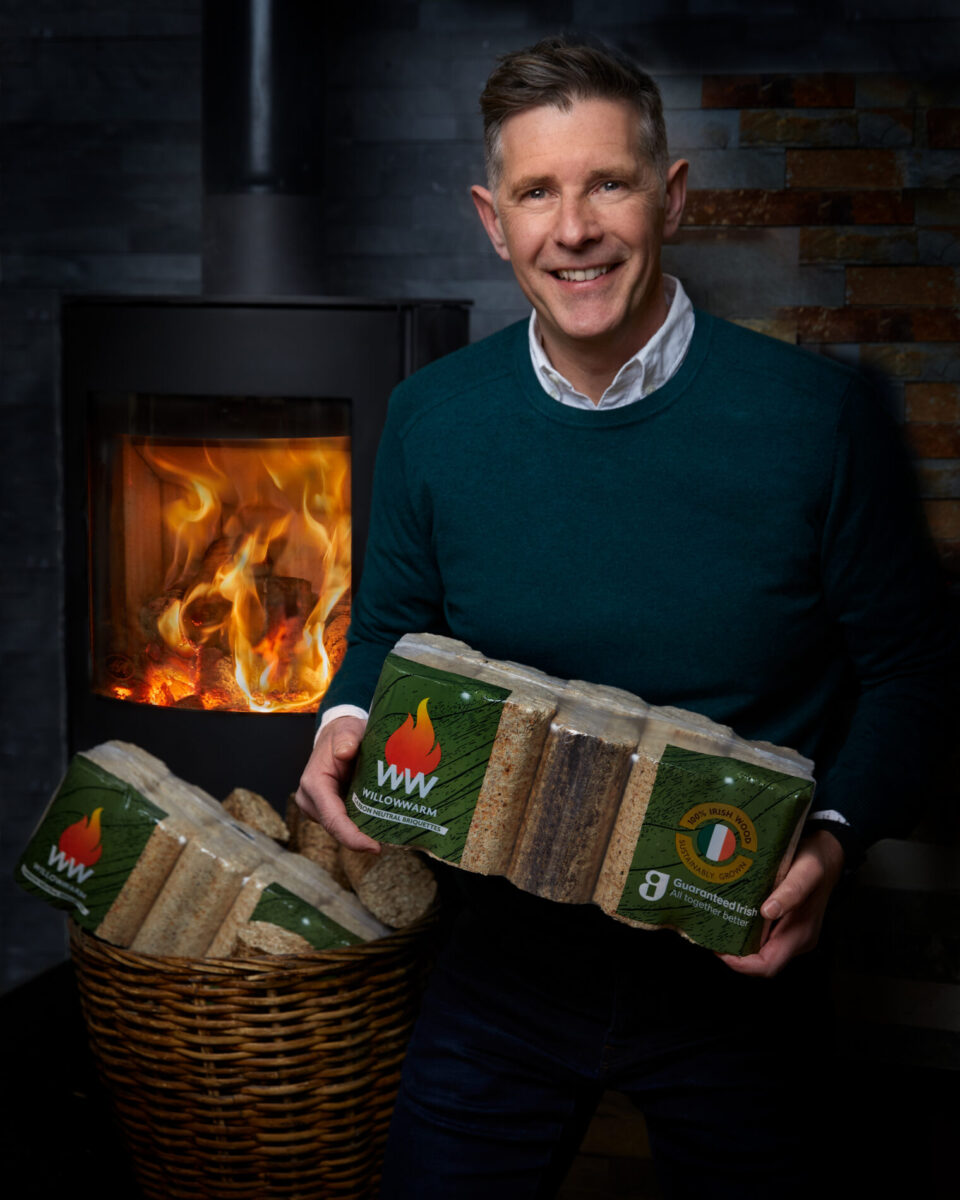|
The Irish Bioenergy Association (IrBEA) and the Fuel Quality Assurance (WFQA) Scheme organised a series of wood fuel drying demonstrations and workshops over the last two months. These events were kindly hosted by WFQA members, Sherlogs, Brennans Hardware and Cotter Bros Firewood who are all certified firewood suppliers.
Wood fuel drying is a pivotal stage in the production of quality wood fuels. New air quality regulations require firewood to meet specific standards, meeting the moisture content requirements have proven a challenge for some suppliers. Various drying methods can be used to season firewood, including polytunnel drying, kiln drying and air drying. The techniques used vary depending on wood type, desired moisture content, production scale, and resource availability. This series of workshops explored each option to allow suppliers determine the best method for them. These free events were open to IrBEA & WFQA members, potential new members, firewood suppliers, forest owners and interested stakeholders. The WFQA will complete full reports of each day and the techniques used in published factsheets later this summer, however we have completed a brief of each day below. Workshop 1: Sherlogs – Poly Tunnel drying Sherlogs are a firewood supplier in Navan Co. Meath, operated by John and Evelyn Sherlock they have been supplying certified firewood for over a decade. Sherlogs have perfected methods of air drying round-logs outside to a partially seasoned state, then processing this into firewood and carrying out the remaining drying in specially designed poly tunnels. Poly tunnels offer a low cost option for drying and storing firewood and have become quite popular with WFQA members. Workshop 2: Kiln drying with Gordon Knaggs and Brennans Hardware This day started in the Keadeen Hotel with lectures from Gordon Knaggs and Noel Gavigan on kiln drying. Gordon is a recognised expert in kiln design and operation within the sawmill sector, he discussed in detail the processes going on in a kiln, the key features of drying timber evenly, and kiln design to assist even drying. Afterwards the workshop proceeded to Brennans Hardware, who recently installed a Firemaster Kiln, on hand was Noel Blair of Firemaster who gave a thorough demonstration of the kiln design and operation. Workshop 3: Cotter Bros Firewood – Air drying Cotter Bros Firewood have perfected methods to air dry firewood to under 20% through careful stacking and monitoring of roundwood, followed by open shed storage to allow for final drying down to the required moisture content. Cotters are certified suppliers for over a decade and their methods have ensured cost effective and reliable production of firewood under 20%. They outlined how their consumers have become accustomed to, and now expect firewood to be under 20%, this has greatly assisted Cotter Bros to hold a protected customer base who appreciate the value of good quality fuel. At the conclusion of the last event Noel Gavigan, WFQA auditor said: “Through these workshops and site visits, participants will gain practical insights on wood fuel drying, interact with industry experts and exchange knowledge. These workshops are designed to assist wood fuel suppliers to meet their moisture content requirements as specified under the Solid Fuel. We are extremely thankful to our host members who were very generous with information, and in demonstrating their techniques to all attendees, their dedication to improving the skillset of the entire industry is commendable. The solid biomass and wood fuels sector is a crucial handler of forestry thinnings and residues. As Ireland seeks to decarbonise energy uses and move away from fossil fuels to renewable energy, solid biomass has the potential to be a significant driver of this change. Seán Finan concluded: “The raw material used to produce wood fuels including firewood, pellets and chip and briquettes are sourced from sustainable forest thinnings and residues from Irish forests. The use of dry wood fuels which are renewable, locally grown and produced are a sustainable form of solid fuel which can aid consumers to move away from fossil fuels. Dry wood fuels are critical to reducing air quality issues and maximising energy output.”
0 Comments
Workshop Series:
Workshop 1: Thursday 16th May 2024 - Polytunnel Drying - Sherlogs, Co. Meath Industrial scale polytunnels are an excellent tool to accelerate air drying while also providing fuel storage. Properly designed tunnels offer a controlled environment with elevated temperatures conducive to fast wood drying. Particularly advantageous for smaller-scale operations or regions with unpredictable or adverse weather conditions, polytunnel drying provides an effective alternative to traditional outdoor drying methods. Registration link here COMPLETED Workshop 2: Thursday 30th May 2024 - Kiln Drying - Keadeen Hotel, Newbridge, Co. Kildare Kilns are used to rapidly dry wood fuels with artificial heat and airflow. While kilns do have an associated capital and operational cost, they can effectively reduce the drying time from several months to a few days. Fuel drying can be relatively low tech. At this workshop, we will be hosting a kiln expert who will explain the fundamentals of proper kiln drying. Kiln drying offers faster and more uniform drying compared to air drying, making it a valuable tool for large and small-scale wood fuel production facilities seeking to have more control over fuel production. Registration link here Workshop 3: Saturday 15th June 2024 - Air Drying - Cotters Bros Firewood, Co. Limerick This approach involves the correct stacking of wood in open-air environments with ample airflow and sunlight exposure. Air drying, when done correctly is an effective low cost method of producing wood fuels. However, it does require care, time, attention and space. Air drying is often a precursor to further drying processes such as kilns and polytunnels, particularly suited for smaller-scale operations. This site operator has perfected various air drying techniques which allow them to consistently produce firewood at under 20% moisture content. Registration link here UK Industry Tour 4: 1st week of June (tbc) - Tour of Kiln Drying sites We will be hosting a 2-day study tour to the UK to meet with firewood producers utilising various kiln designs to produce firewood to 20% moisture content. This excursion will afford participants invaluable insights into kiln operations, further details will be provided shortly. The trip will be held in the first week of June with dates and full details to be confirmed. Expression of interest here For Immediate Release
15th February 2024 The Irish Bioenergy Association (IrBEA) has published a guide to Specified Biomass Harvesting (SBH) as part of sustainable forest management. Ireland has grown a significant forest resource over the past century since independence, with much of this forest resource now reaching harvest stage. Maximising the value of this harvest, while protecting the forest environment and optimising future crops are challenges that are being addressed through sustainable forest management. Noel Gavigan, IrBEA Technical Executive and co-author of the report said: “As a biomass fuel, SBH displaces fossil fuels with significant greenhouse gas savings. This is achieved through fossil displacement and avoidance of emissions from decaying residues on site. Where SBH is harvested reforestation costs can be lowered and regeneration is more uniform.” SBH has the potential to provide a significant amount of renewable fuel while facilitating regeneration and closing the forest cycle. Eugene Hendrick, chairman of the Wood Fuel Quality Assurance (WFQA) said: “Irish foresters and forest owners, and those involved in forest certification now have the guidance to hand to enable sustainable harvest of an additional forest energy assortment through SBH. This publication brings together previous research and summarises current best practice. Following the guidance will provide for better biomass and better future forests assurance to growers. Donal Whelan, Technical Director of the Irish Timber Growers Association said “This SBH document is a win-win for forest owners by improving returns, the environment by reducing replanting ground disturbance and windrowing requirements, and the State in facilitating the achievement of national bioenergy and climate change targets.” Kenneth Worrell, Worrell Harvesting said, “I welcome the launch of this report which demonstrates the sustainability of our certified harvesting systems which is supported with our Log-Watch traceability system and will open the opportunity to sustainably harvest SBH from certified forests.” Seán Finan, IrBEA CEO concluded “We call on Minister Ryan and his Government to urgently recognise the significant role that solid biomass can play in decarbonising our energy uses. A basic first step is to recognise the potential of solid biomass in key Government policy documents and as a readily available decarbonisation option in achieving renewable energy targets. We need to also see an enhanced focus and increased promotion by Government, of the biomass support available through the Support Scheme for Renewable Heat (SSRH).” ENDS. For further information contact Noel Gavigan 087-6845977 [email protected] Notes to editors The document can be found on the IrBEA website at https://www.irbea.org/specified-biomass-harvesting-good-practice-guidance-energy-assortment-harvesting-clearfell/ What is Specified Biomass Harvesting (SBH) Typically, forests are mostly grown for roundwood production. Specified Biomass Harvesting (SBH) refers to the planned and specified harvesting of tops and branches which are removed during normal felling operations for use in energy or other uses according to market demand. SBH also facilitates forest regeneration, more efficient subsequent crop management, and more uniform and higher quality crops in future cycles. IrBEA has published this technical guide aimed at foresters, forest owners, environmentalists to outline how SBH should be practised in a cost-effective and sustainable way, while addressing. The IrBEA document has been welcomed by the Department of Agriculture Food and Marine, as it provides important information and guidance on energy assortment harvesting considering sustainable forest management. About the Irish Bioenergy Association (IrBEA) IrBEA was founded in 1999. Its role is to promote the bioenergy industry and to develop this important sector on the island of Ireland. The diverse membership includes farmers and foresters, fuel suppliers, energy development companies, equipment manufacturers and suppliers, engineers, financiers and tax advisers, legal firms, consultants, planners, research organisations, local authorities, education, and advisory bodies – anyone with an interest in the bioenergy industry. IrBEA is recognised by Government and agencies as the voice of the bioenergy industry. The association’s main objectives are to influence policy makers to promote the development of bioenergy, and to promote the interests of members. Improving public awareness, networking, and information sharing, and liaising with similar interest groups are other key areas of work in promoting bioenergy as an environmentally, economically, and socially sustainable energy. Further information on the association is available at www.irbea.org About the Wood Fuel Quality Assurance Scheme IrBEA manages and administers the Wood Fuel Quality Assurance (WFQA) Scheme. The scheme certifies suppliers of wood fuels including firewood, chip, pellet, and briquette. Certification is to the quality standard I.S. EN ISO 17225 Solid biofuels — Fuel specifications and classes. The standard is used across the globe for specification, trade and regulatory purposes in relation to wood fuels. The WFQA is governed by a steering committee made up of representatives of the WFQA membership, IrBEA industry members, DAFM, SEAI and a consumer representative. WFQA members are audited and certified annually based on conformity to I.S. EN ISO 17225. WFQA certification satisfies the requirements for wood fuels under the Support Scheme for Renewable Heat (SSRH) & the Air Pollution Act 1987 (Solid Fuels) Regulations 2022. Further details are available at www.wfqa.org Specified Biomass Harvesting - Good Practice Guidance for Energy Assortment Harvesting at Clearfell2/7/2024 The Irish Bioenergy Association (IrBEA) has identified the valuable, renewable biomass fuel resource provided by Specified Biomass Harvesting (SBH), which is an abundant source of renewable fuel for use in larger scale heat and power generation. This report provides a guide for foresters and stakeholders on how to harvest SBH without adversely affecting the forest or local ecosystems and environment.
Ireland's forestry resource has the potential to provide large volumes of by-product material for energy use through harvesting specified biomass during normal thinning and harvesting operations. This by-product material, which is in addition to the harvesting of timber and pulp products, is usually described as the side branches and tops of trees - material also known as brash, which will otherwise be left in the forest site. By harvesting this material through specified means, it is possible to generate large volumes of useful biomass for energy while enhancing sustainable forest management practices. It is critically important that this harvesting is carried out in a manner that protects the future productivity of the forest, the local ecosystems, and water courses. This guide, which was developed by the Irish Bioenergy Association with contributions from its members and associated organizations and stakeholders, will greatly assist foresters and other stakeholders in determining what material can be harvested while ensuring optimal forest production and protection of the local environment. Read the full report here. At CelticLogs we produce Kiln Dried Hardwoods - mainly Ash, Beech, Oak and Seasoned Softwood - mainly Sitka Spruce.
Our Kiln Dried Hardwood Logs have a guaranteed average moisture content of less than 20% (typically 15-20%) and our Air-Dried Softwood has a guaranteed average moisture content of less than 25% (typically 18-25%). With a guaranteed 25% or less Moisture Content our Firewood gives intense heat, burns longer and minimises residue on glass fronted stoves & flues. Simply put when you buy dry Firewood you get more heat for your money. www.celticlogs.ie/index.php Great to see one of our members has Dermot Bannon as their brand ambassador
Why WillowWarm Briquettes? WillowWarm Briquettes are grown and produced in Ireland. They are an environmentally-friendly, value for money alternative to traditional fuel briquettes, giving off more heat with a long, clean burn. WillowWarm Briquettes are suitable to all open fires, stoves, chiminea, and more. https://willowwarm.ie/ |























 RSS Feed
RSS Feed